#in greek mythology...there's triumph and victory
Text
Why Jason Grace is The Most Tragic Character in the Riordanverse
*in no way is this trying to dial down Nico's own suffering, I'm just stating my case for Jason because godsdamn SOMEBODY needs to say it!*
@most-tragic-character-tournament here's propoganda i came out guns ablazing
List of why fans are saying Nico:
Lost his mother
lost years of his life
found out he was a demigod at age 10
lost sister at 10
rough relationship with his dad
closeted gay
crush is madly in love with somebody else
forced to come out
List of why Jason is more tragic:
Lost his mom to alcoholism/mental decline
Lost his ENTIRE FUCKING CHILDHOOD because Said Mom gave him up to Juno to be raised by a PACK OF WOLVES who would've EATEN HIM if he was WEAK FOR EVEN A SECOND - AS A FUCKING TWO YEAR OLD
Was a trained demigod FROM THE GET-GO (again, TWO YEARS OLD)
Because of previously stated separation, was TAKEN FROM HIS SISTER WHO LOVED HIM SO MUCH SHE RAN AWAY BECAUSE SHE COULDN'T TAKE THE GUILT AND FEAR AND RAGE THAT FILLED HER AT HIS ABSENCE
Was set up into a "perfect" relationship by Juno/Hera WHILE HAVING HIS MEMORIES TAKEN
Jason may not have had the awful forced outting Nico had to go through, but...that's not really his fault? Nobody has any control over their sexual identity, and Jason? Well. He never really got to explore it. Because that was taken from him too.
Thinks he LOST LEO VALDEZ, ONE OF HIS ACTUAL FIRST FRIENDS, WHO LIKED HIM FOR HIM AND NOT BECAUSE OF HIS STATUS
FORCED TO COMPLY TO A DEMANDING SOCIETY THAT EXALTED HIM FROM DAY 1 BECAUSE HIS DAD IS THE OH-SO-IMPORTANT JUPITER (*cough victim of nepotism cough*)
AND WHEN HE TRIES TO COMBAT THAT NEPOTISM HE KEEPS GETTING PUSHBACK UNTIL HE FALTERS
then. then his girlfriend breaks up with him - not because of any drama, or even a disagreement, but over a very valid point
their relationship didn't exactly start out very...honestly. Jason had been mind-wiped of all memories and Piper had fake ones implanted into her to make her think she liked Jason as more than a friend. sure. they had a pretty nice relationship, but when everything slowed down and they took a look at their lives?
Piper's the one who sees it first, and makes the decision. Jason is heartbroken, but understands - he even, dare I say, agrees that they should end the relationship. it was built on fake memories - you could say it was built on lies.
and now Jason has this opportunity to step back and analyze who he is and what he wants.
what he finds is depressing. everything he's had, everything's he's been up till now...
it's not him.
he never wanted to be raised by Lupa and her wolves.
he never wanted to be Jupiter's son
he never wanted to be the exalted leader Camp Jupiter praised him for
From day 1 his life was somebody else's. his first steps were under the tutelage of a wolf, not of the loving eyes of his sister
Camp Jupiter only ever saw him as the demigod to be praised and turn to above all others, even before he became praetor.
Jason's life...was never his own.
and now that he's away from all that pressure and expectation...he doesn't know who he is.
Son of Jupiter?
Champion of Juno?
Praetor of the Twelfth Legion?
Member of the Prophesized Seven?
Hero of Olympus?
no. he was never himself under these names.
he was never...Jason.
but maybe now he could start navigating his own life. without some god intervening for once. this would be good for him, and for Piper, to find their own way.
but then. then they talk to Herophile...and find out one of them will die. And Jason? Well, he's not going to let Piper be taken from the life she deserves. he may not be her boyfriend, her knight in shining armor, but he sure as HELL loves her - especially as a friend. And if there's one thing you should know about Jason? It's that he loves his friends.
so what does he do? He sacrifices himself. He duels Caligula himself, and urges Piper, Meg, and Apollo to Go, save yourselves! and -
he's stabbed. through the chest. the only thing he can do? Look to Apollo, to the blue gaze so much like his own drenched in horror, and ask; Remember. because he didn't get to live the life he wished, but maybe Apollo could - no, Apollo can, he can make the difference Jason wanted. Because he trusts Apollo.
Jason doesn't regret his sacrifice. he saved Piper from the prophecy, after all. He saved Apollo & Meg's lives too.
in fact, Jason didn't really mind dying. Because he didn't have much of a life either. And a life like that? shrug It's worth sacrificing for those who deserve theirs.
and as icing on the cake, remember who Jason's father is? The almighty, all-powerful Jupiter himself, King of the Gods?
he doesn't do a damn thing to help Jason. Not a single. Thing.
because Jupiter/Zeus doesn't care about his children. Especially his sons.
Zeus saved Thalia. But he didn't even try to save Jason.
Trying would have at least lessened the pain...
People like to claim Jason is a bland, boring character who's never suffered a minute in his life. That he's a golden retriever with no flaws.
Well.
Take a look up there and ask yourself - it that the life of a boy who knows no suffering?
Because it sure as hell don't look that way to me.
To me, it looks like Jason was a used, depressed young man who never got to choose his own path. Who's father abandoned him first to his wife's mercy, then to a cruel emperor's.
Jason Grace suffered.
and he never got to live that happy life he saw within the Fates.
Never got to get that family, those grandchildren he saw himself telling the story of the Argo II to.
Because The Fall of Jason Grace is a true, utter tragedy.
#jason grace#i have feeeeelings#remember when people complained about jason being “boring” and then rick was like “okay he's dead now” and then those same people screamed#about never reading toa because “how could rick do that!!! jason was supposed to marry piper and have kids!!!! :(((”#well my friends you DO remember the first page of the lightning thief don't you?#“look i didn't want to be a half-blood”#being a half-blood is dangerous#sometimes it can get you killed in painful nasty ways#~don't say i didn't warn you#- percy jackson#rick warned us at the very beginning#in greek mythology...there's triumph and victory#but the one thing greece is known for in theater?#it's tragedy#and rick perfectly displays it with the fall of jason grace#life's not all sunshine and rainbows#it's not going to be “they all lived happily ever after the end”#it wouldn't be a greek story without tragedy#and really...how many of you ~actually~ cared about jason until he died#hmm?#i'm not judging#i ~was~ one of those people#he wasn't my favorite but i was more...eh about him#he existed for me#until i took a step back and looked at his life and went...#oh.#he's not who i thought he was#and he's not who you think he is either#thank you for coming to my tedtalk#the burning maze
199 notes
·
View notes
Text
Copy and pasted from elsewhere:
NEVER SAW IT THIS WAY. VERY POWERFUL POINT OF VIEW.
.
Medusa was a victim of sexual violence and the story you know turned her into a villain.
.
Medusa is one of the easiest-to-recognise characters in Greek mythology. With its unmistakable snake hair and the power to turn whoever looks at it into stone, it is one of the most popular monsters in ancient stories.
.
But there’s a part of their story that not everyone knows that will completely change your perspective.
.
Snake lady didn't always have a creepy appearance. Medusa was one of the Three Gorgon Sisters (a kind of female monster). Unlike Esteno and Euriale, she was the only mortal in the family.
.
Ovidio was a Roman poet considered to be one of the most important in Latin literature and was also one of the first to describe how the mythological being became a terrible creature.
.
The Encyclopedia of Ancient History quotes Ovidio briefly, but impactful. Medusa was a beautiful young lady and Poseidon wished her for him. The god of the seas attacked and raped her inside a temple dedicated to Athena.
.
The goddess took this attack as an offense and punished the woman by giving her snakes instead of hair and with the curse of turning anyone looking at into stone.
.
After that chapter, comes the most popular: the one where Perseus kills the "terrible" Medusa. King Polydectes was in love with Danae, the mother of Perseus.
.
His son did not approve of this relationship because he considered the sovereign lacked honor. To get rid of the son, Polydectes asked him to get the head of the gorgon.
.
As the Metropolitan Museum of Art points out, the gods helped Perseus in his mission and gave him gifts to ensure his victory. A key piece in her triumph was the polished shield of Athena, which allowed her to approach Medusa and avoid her dangerous gaze.
.
When Perseus beheaded her, from her neck sprouted the giant Crisaor and winged horse Pegasus. Both are considered to be Poseidon's children, which means they were the product of a rape and Medusa was pregnant when she was murdered.
.
It's not unusual news that Greek mythology is plagued with accounts of abuse and violence, but it's interesting (and tragic) to find out that Medusa is still remembered as a monster when her only "crime" was being attractive.
.
The victim was also the only one to receive punishment for Poseidon's acts. And even Athena created the flute to imitate Esteno and Euriale's lamentations after their sister's murder.

🙌🏽
16 notes
·
View notes
Text
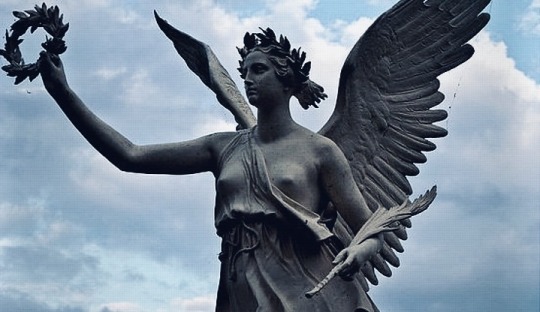
Goddess Victoria is a deity from Roman mythology who personifies victory, similar to the Greek goddess Nike. She held an essential role in Roman society and religion, especially in the context of the military. The Romans believed Victoria was the one who granted success in battle, and thus, she was often invoked by generals and soldiers.
Victoria was depicted as a beautiful woman with wings, often seen with a wreath or palm branch to award to the victors of battle or competition, symbolizing the success and achievements. This imagery underlines her role as a messenger of victory. Temples were built in her honor, where she was worshipped and celebrated, and various festivals were held to venerate her, emphasizing her importance in Roman culture.
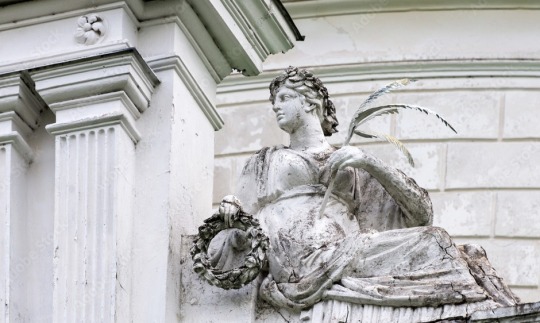
Over time, Victoria became a symbol not only of victory in war but also of the peace and prosperity that followed. Her symbolism has endured through the centuries, influencing representations of victory and triumph in Western art and culture.

2 notes
·
View notes
Text
DYEing for FISH!
As the clue in the title suggests, more colour words derived from Latin and Greek for you tonight. Welcome to Cool Colours IV.
Why the 'fish?', you ask. Well, tonight is purple's turn. This colour comes from the Latin purpureus, which is closely linked to the Greek πορφύρη (porphyre). The Greek colour word is the same as that word from the fish from which the colour was obtained. Some theories suggest it was more reddish than what we could now normally call 'purple'. But the cool fact still remains, our colour purple takes its name from a fish. It was hard to obtain and, therefore, expensive and it is not hard to see why purple came to be associated with kings, wealth, and power. Macedonians wore purple. The Etruscans kings were believed to, as did Roman emperors perhaps following Etruscan tradition. Before the emperors the colour was donned by the victorious general in his celebratory triumph procession, and ONLY for the procession, lest he form any ideas of grandeur.
How does this relate to the ghastly disease porphyria? You will undoubtedly have spotted the connection with the Greek word for the colour. The link is colour. This illness turns urine a reddish-purple.
On to more pleasant colour-related, linguistic connections. The sweet, light shade of purple known as violet also comes from Latin, named after the viola flower, from which the colour gets its name.
We follow with indigo, which literally means 'the Indian dye', coming via Latin from the ancient Greek ἰνδικόν, referring to a plan believed to come from India, which yielded a deep blue-purple dye.
Lastly, we come to the word iodine. Hang on, iodine's not purple you cry. Well, true it isn't, but the 'io' that begins the word comes from a Greek word for purple. ἴον was in fact the Greek word for 'violet'. Iodine was originally the Greek ἰοειδές (ioeides) meaning 'violet in appearance'. The name 'iodine' for the element was coined by French chemist Joseph Louis Gay-Lussac in the 19th century. The violet plant in Greek mythology was a symbol of modesty and chastity, after Artemis, sworn maiden goddess of hunting, changed one of her nymphs, pursued by her lustful brother Apollo, into a violet to protect her.
So, lots of words for a colour that in its variants is both the colour of kings and modesty. This article is, therefore, something of a PURPLE patch...Okay, gets coat, checking out, see you all for more Cool Colours soon.
25 notes
·
View notes
Text
tarot and oracle message from seneca
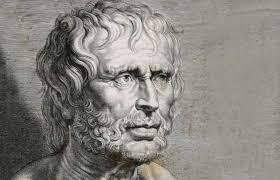
This morning rather around 3 am, I felt the energy of Seneca. A first, the day after full in scorpion. With the oracle of Greek mythology, he speaks of fear, of making a bad choice, of being lost, of anxious energy. Then he speaks of a more global understanding of a situation, perhaps another step in the journey of life, away from the ego. Creativity and gentleness can take much more than the quest for power in the victory of life.
With the energy oracle. We have a man with a gold coin, he is abundant and yet he is plagued by difficulties and egregores, we must maintain social masks. The only thing to do is to let knowledge, light, peace come into your life, let the transformation take place and let the world change. With our inner power we can free ourselves from that and find our place, our balance in this world that men have created.
With the tarot cards, certain difficulties are there to help us find a base, an impulse or something unexpected can bring us to our shore better better for us, something more solid in time with more wisdom and anchor. This will be our victory.
With the oracles of the son of time we have made our truth, our soul, triumph over the shadow that has to go through destruction and hell because we are here to learn, it is the symbol that the soul works and takes the height on a situation is the proof of the ability to manifest with the help of the universe, to create energies conducive to an encounter with oneself, with our soul tie....
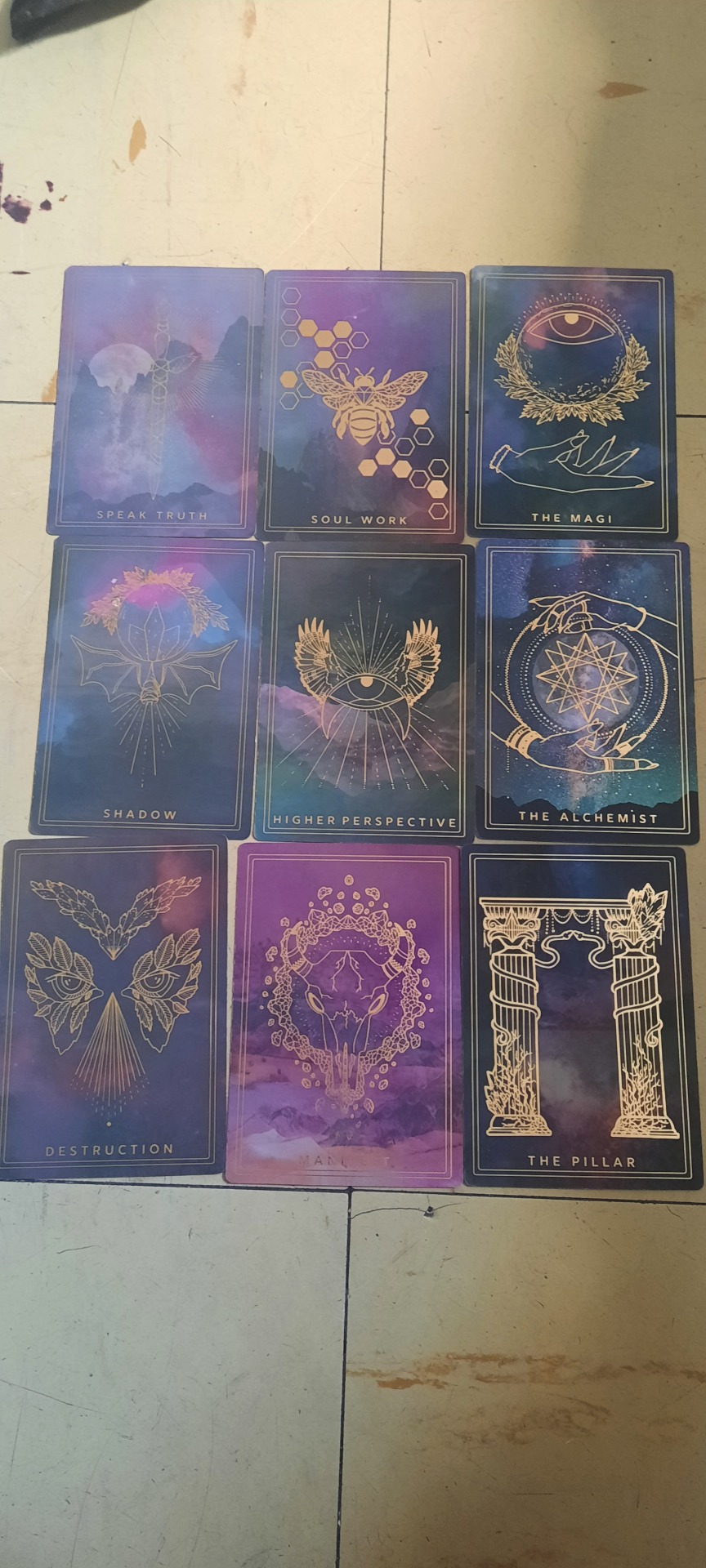



6 notes
·
View notes
Text
30+ Names That Mean Chosen One: Exciting and Meaningful – Impeccable Nest
Names associated with destiny and fate have been popular for centuries. Many parents choose a name for their child in the hopes it will shape who they become. Here are some options to consider if you want a name meaning "chosen one":
Elijah means "Yahweh is God" in Hebrew. In Judaism and Christianity, Elijah was a prophet who was chosen by God to play a pivotal role. Ezra means "help" or "helper" in Hebrew. According to Jewish tradition, Ezra helped restore and reconstruct Jewish spiritual and religious life in Judea after the return from Babylon exile.
Neo is a Greek name meaning "new," as in someone new or unique who could bring change. It's probably most famous as the name of "The One" character in the Matrix films who was prophesied to save humanity. 😉 In Greek mythology, Nike was the goddess and personification of victory. She represented the triumph of heroic achievements and was often depicted as winged.

0 notes
Text
Title: The Divine Chronicles: A Clash of Gods
Chapter 1: The Awakening
In the realm of Mount Olympus, the gods and goddesses of ancient Greece lived in eternal splendor. Zeus, the mighty king of the gods, ruled over this divine domain with his wife, Hera, by his side. Their power was unmatched, and their influence extended far beyond the mortal realm.
However, a dark force was stirring in the depths of Tartarus, the underworld. Hades, the god of the dead, had grown tired of his eternal confinement and sought to overthrow Zeus and claim Olympus for himself. With the help of his loyal allies, Hades devised a plan to unleash chaos upon the gods and goddesses.
Chapter 2: The Gathering Storm
Word of Hades' treachery reached the ears of Athena, the goddess of wisdom and war. She knew that if Hades succeeded, the balance between the gods and mortals would be shattered, plunging the world into darkness. Determined to prevent this catastrophe, Athena set out to assemble a team of powerful gods and goddesses to stand against Hades.
First, she sought the aid of Ares, the god of war. Though known for his reckless nature, Ares possessed unmatched strength and combat skills. Next, Athena approached Apollo, the god of light and music, whose divine archery skills would prove invaluable in the battles to come.
Chapter 3: The Trials of Olympus
As Athena continued her quest, she encountered Artemis, the goddess of the hunt, and Hermes, the messenger of the gods. Both agreed to join the cause, bringing their unique abilities to the fight against Hades. Together, they formed an unlikely alliance, bound by their shared desire to protect Olympus and the mortal world.
Chapter 4: The Battle Begins
With their team assembled, Athena and her allies prepared for the ultimate showdown with Hades. They knew that defeating the god of the dead would not be an easy task, but they were determined to restore peace and order to the divine realm.
The battle raged on, with gods and goddesses clashing in a spectacle of power and fury. Lightning bolts hurled through the sky, arrows flew true, and swords clashed in a symphony of divine might. The fate of Olympus hung in the balance as the gods fought for their very existence.
Chapter 5: The Triumph of Olympus
In the midst of the chaos, Athena and her allies managed to outwit Hades and his minions. Through their combined strength and cunning, they were able to defeat the god of the dead and restore order to Olympus. The gods and goddesses rejoiced, grateful for the bravery and determination of their champions.
With Hades defeated, peace was once again restored to the divine realm. The gods and goddesses resumed their roles as protectors of the mortal world, ensuring that the balance between gods and mortals remained intact.
Epilogue: A New Era
The victory over Hades marked a turning point for the gods and goddesses of Olympus. They realized the importance of unity and cooperation, understanding that their individual strengths were amplified when combined. From that day forward, they vowed to work together to face any future threats that may arise.
And so, the divine chronicles continued, with the gods and goddesses of ancient Greece standing as beacons of hope and guardians of the mortal realm. Their actions would forever be remembered, their stories passed down through the ages, reminding humanity of the power and resilience of the gods.
Note: The novel "The Divine Chronicles: A Clash of Gods" is an action-packed adventure that explores the world of Greek mythology. The writing style intentionally avoids a specific style, allowing the story to flow naturally while maintaining a focus on action and excitement. The language used throughout the novel is English, ensuring accessibility to a wide range of readers.
0 notes
Text
This statue is one of the six monumental marble figure groups depicting The Labours of Hercules. These statues were commissioned from Vincenzo de' Rossi for the Salone dei Cinquecento of the Palazzo Vecchio in Florence.
In Greek mythology, Hercules (Greek Heracles) was a hero and the personification of physical strength and courage.
He is one of the most popular figures in classical and later art.
Hercules's twelve labours were undertaken as a penance for slaying his old children in a fit of madness. He was ordered by the Delphic oracle to serve Eurystheus, king of Tiryns, for twelve years and to undertake any task he might require.
Serving a mortal in a menial role was the punishment for a god who offended the Olympians. Originally simple tales of the victory of the strong, they acquired in time a moral symbolism, the triumph of right over wrong.
The eighth labour of the twelve, represented by this group of Rossi, is "The mares of Diomedes". These wild animals lived on human flesh. Hercules, with a brand of friends, seized them, and in the ensuing battle with their owner, King Diomedes, and his men, the king was slain.
Source: Web gallery and art

0 notes
Text
Red haired girl warrior spear girl viking

Zenevieva - Slavic, means "woman of the people".Zelda - English, Spanish, means “gray fighting maid".Wyetta - Old English, means "war strength".Wilma - German, means "will helmet" or "protection".Valerie - English, German, Czech, means, “strength, health”.Valentina - Italian, Russian, Latvian, German, Croatian, Bulgarian, Macedonian, Slovene, Romanian, Spanish, Greek, Ancient Roman, means “strong, vigorous, powerful”.Valencia - Spanish, means "strong, victorious".Velda - German, means "ruler" or "power".Tyra - Scandinavian, means “Thor’s warrior”.Trudy - German, means "spear of strength".Thora - Scandinavian, means "Thor's struggle".Shahrzad - Persian, means "bringing freedom to the city".Shamra - Arabic, means "ready for battle".Sandra - Italian, English, French, Spanish, Portuguese, German, Dutch, Swedish, Norwegian, Danish, Icelandic, Latvian, Lithuanian, Polish, Slovene, Croatian, Serbian, Macedonian, Czech, Romanian, means “defending warrior”.Sasha - Russian, Ukranian, English, French, means “defending warrior”.Reika - German, means "power of the wolf".Philomena - Greek, means "lover of strength".Nirvana - Sanskrit, means "one who blows out".Nicole - French, means "victory of the people".Moxie - American, means “boldness and strength of character”.Morgan - Welsh, English, French, means “sea warrior”.Mildred - English, means "gentle strength".Minka - Polish, means "strong-willed warrior".Mia - Scandinavian, means "ocean goddess" or "queen".Meredith - Celtic, means, “protector of the sea".Melisende - Medieval French, means "strong".Matilda - German, means “battle-mighty”.Malin - English, means “strong" or little warrior”.Maeve - Irish Mythology, warrior queen of Connacht.Louisa - English, German, Dutch, means "famous battle".Louella - English, means "famous battle".Keren - Hebrew, means "strength, power".Kennedy - Gaelic, means "protected with helmet".Karleen - Old German, means "womanly strength".Gesa - Dutch, means "strength of a spear".Gertrude - English, Dutch, French, means "spear of strength".Gabriella - Italian, means "God is my strength".Finley - Scottish, means “fair warrior”.Fianna - Irish, means "band of warriors".Fallon - Irish, means “superiority descended from a ruler”.Fairuza - Persian, means "woman of triumph".Elaheh - Persian, means "like a goddess".Edrei - Biblical, means "strong and powerful".Ebba - German, means "strength of an animal".Dusty - Norse, means "tough like the stone of Thor".Diana - Roman Mythology, goddess of the moon, hunting, forests, and childbirth.Chasina - Aramaic, means "strong, mighty".Cassandra - Greek, means “man’s defender warrior”.Carla - Italian, Portuguese, Spanish, Catalan, English, German, Dutch, means "army" or "warrior".Camilla - Roman Mythology, a legendary warrior maiden.Bryndis - Scandinavian, means "strong armor".Brielle - English, means “warrior of God”.Bridget - Irish, means “exalted one" or "power”.Bria - Irish, means "power, strength, vigor".Bernadette - German, means "strong and brave as a bear".Bellona - Roman Mythology, goddess of war, means "personification of battle".Bellatrix - Latin, means “female warrior”.Audrey - English, means "noble" or "strength".Audelia - English, means "noble" or "strength".Athena - Greek Mythology, goddess of wisdom and of war.Artemis - Greek Mythology, goddess of the moon and of the hunt.Aoife - Irish Mythology, a warrior princess.Annemarie - Hebrew, means "rebellious woman".Andrea - English, German, Spanish, Czech, Slovak, Hungarian, Swedish, Norwegian, Danish, Icelandic, Dutch, Croatian, Serbian, means "manly, masculine".Alvilda - Norse, means "battle of elves".Althea - Greek Mythology, means "with healing power".Alexandria - English, means "helper, defender".Alexandra - Greek, means "helper, defender".Alessia - Italian, means "helper, defender".Aine - Celtic, means "radiance, splendor, brilliance".Aadya - Bengali, means "first" or "Earth" referring to the power that created the Earth.If you’re looking for a list of names which evoke the strength of a warrior princess, this is the ultimate collection of warrior names for girls. More: The Most Popular Viking Names to Inspire Your Search Give your little girl a strong name indicative of the strong woman she’ll one day become from this list of baby names that are perfect for a warrior princess! You can’t go wrong with these fierce names which mean “warrior” and “soldier,” and have a variety of origins.

0 notes
Text
instagram
In Victoria - Elizabeth II, Niue, 2022, 2 Dollars (NZD), Silver (.999), Antique Finish, Partially Gilded, Mintage: 799, 62.2 g, 38.61 mm
A laurel wreath is made of branches and leaves of the laurel, a type of evergreen shrub or small tree. In Ancient Rome, it was worn on the head as a symbol of triumph. The symbol of the laurel wreath is from Greek mythology. The Romans adopted the symbol because they admired Greek culture. In Rome, they were symbols of military victory. Military commanders or emperors often wore them after a battle. Laurel wreaths in ancient times are most often shown as a horseshoe shape. Laurel wreaths were also used as a funeral decoration.
Mint: mw Mint of Poland (Mennica Polska), Warsaw, Poland (1766-date)
#coin#coincollection#coinhunting#coinphotography#coins#coinscollection#currency#hobby#numismatica#numismatist#laurel#niue#colloseum#gladius#ancient rome#ancient greece#victory#coincollecting#coincollector#coincollections#coincollectors#rare coins#silverstacking#silverstacker#silver#numizmatyka#numismatique#numismatics#numismatik#numismática
0 notes
Text
Poem of the day #99

#not mine#poem#poem of the day#poetry#greek myth#greek mythology#gods#goddess#god of war#war#nike#victoria#athena#sword#soldiers#minerva#battle#fight#victory#triumph#ares#mars#child of war#inspiration#inspiring#pain#glory#death#greek roman myth#shadow
6 notes
·
View notes
Text
i know mitski was talking about laurel thickets that grow in south appalachians in her album title, but here’s another theory:
in ancient greece, laurels were a sign of victory or triumph, and a person would wear a pair of ‘laurels’ on their head or around their neck if they had achieved or won something. so when mitski named her album ‘laurel hell’, she was talking about the hellish nature of her supposed victory. mitski has achieved wide fame and acclaim, something that many musical artists work towards. mitski has triumphed. but the fame also comes with extreme pressure and other downsides, which is the ‘hell’ mitski is referencing in the title.
also, if we’re still talking about ancient greece, in greek mythology there’s the fields of eternal punishment in the underworld. the ‘hell’ in the album title could be referencing this, how mitski feels like she is now forever trapped in making things and performing for the public
(this is also referenced in ‘working for the knife’, where mitski sings about the pressure of creating and making things.)
#mitski#laurel hell#working for the knife#the only heartbreaker#mitski theories#mitski theory#idk this is just sorta how i interpret it feel free to add on#might come back to this later but i think the theory has some merit#music
41 notes
·
View notes
Text
beautiful names for women
im sharing my list of original & multicultural names that i found & like, for the female characters in the books i write. I thought it could help some other writers :) There are plenty of different origins and meanings, so that you could find one that fit a character's ethnicity and essence. I love short names a little bit too much, so its mainly one or two syllables here.
SOURCES (mainly) :
nameberry.com
babynames.com
dont hesitate if you want to correct on things that you think are wrong <3

Aitne
origin : greek (mythological name)
meaning : one of the moons of Jupiter, named for a nymph that Zeus seduced. Aitne was the daughter of Oceanus. It is from her name, sometimes also spelled Aetna, that the Sicilian volcano Mt Etna derives its name
Baeg-Ilcho
origin : korean
meaning : "zinnia" - refers to the zinnia flower
Calypso
origin : greek
meaning : "she who hides" - Calypso was referred to as the 'goddess of strange power and beauty'. In Greek mythology, she was an island nymph, a daughter of Atlas, who delayed Odysseus from returning home
Cerys
origin : welsh
meaning : "love"
Delja
origin : polish
meaning : "daughter of the sea" - diminutive of Kordelja
Dione
origin : greek
meaning : "divine queen" - in Greek mythology she is the mother of Aphrodite by Zeus, and also one of Saturn's moons ; this is an astral name quite distinct from the better known Dionne
Dwyn
origin : welsh
meaning : "wave" - diminutive of Dwynwen
Elska
origin : norse
meaning : "love"
Eowyn
origin : old english
meaning : "horse lover" - said to be created by J.R.R. Tolkien
Ersa
origin : greek
meaning : Ersa, daughter of Zeus and the moon goddess Selene, is goddess of the morning dew.
Esme
origin : french
meaning : "beloved"
Farai
origin : african - bantu of zimbabwe
meaning : "rejoice"
Fevziye
origin : turkish
meaning : "triumph"
Gwenore
origin : welsh
meaning : "white shadow, white wave" - variation of Guinevere
Haviva
origin : hebrew
meaning : "well loved" - alternative of Aviva
Hayoon
origin : korean
meaning : "sunlight"
Heli
origin : welsh
meaning : "saltwater"
Ishi
origin : japanese
meaning : "stone"
Ismay
origin : french? (variation of Esme)
meaning : "beloved"
Jael
origin : hebrew
meaning : "mountain goat"
Janan
origin : arabic
meaning : "heart, soul"
Jemsa
origin : spanish, english
meaning : "gem, precious stone"
Kali
origin : sanskrit
meaning : "black one, maiden" - Kali is the Hindu goddess of destruction, the fierce side of the goddess Devi
Kore
origin : greek
meaning : "maiden" - original form of the name Cora, and alternate name for the goddess of the underworld Persephone
Luz
origin : spanish
meaning : "light"
Maz
origin : french?
meaning : "harmful spirits, blue" - nickname of Mazikeen, a name invented by Neil Gaiman ; and Mazarine, a French color name
Meena
origin : hindi
meaning : "blue semiprecious stone, bird"
Merel
origin : dutch
meaning : "blackbird"
Mija
origin : slovene
meaning : "drop of the sea, bitter, or beloved" - diminutive of Marija
Naiad
origin : hawaian, greek, basque
meaning : "dolphin, to flow, wave, sea foam" - variation of Naia
Neoma
origin : greek or hebrew
meaning : "new moon, pleasantness"
Neri
origin : greek or hebrew
meaning : "burning light, ocean spirit"
Ngaio
origin : maori
meaning : "reflection on the water"
Nhi
origin : vietnamese
meaning : "little one"
Nika
origin : slavic
meaning : "bringing victory"
Noor
origin : arabic
meaning "light"
Ntsako
origin : african - tsonga of central africa
meaning : "joy"
Numa
origin : arabic
meaning: "delight"
Ojai
origin : native american - chumash
meaning : "moon"
Öykü
origin : turkish
meaning : "story"
Parvati
origin : sanskrit
meaning : "daughter of the mountain" - Parvati is the Hindu goddess of fertility, love and devotion. She is the gentle and nurturing aspect of the Hindu goddess Shakti and one of the central deities of the Goddess-oriented Shakta sect. In Hinduism, she is the mother goddess
Pasha
origin : greek
meaning : "ocean"
Patzi
origin : native american - omaha
meaning : "yellow bird"
Queniva
origin : old english
meaning : "wife, woman, queen"
Rajani
origin : indian
meaning : "dark, of the night"
Rhea
origin : greek
meaning : "flowing stream" - in Greek mythology, she is the Earth, mother of all the gods
Rokia
origin : arabic
meaning : "charm, magic, superiority"
Sedna
origin : native american - inuit
meaning : "goddess of the sea" - in Inuit mythology, she is the goddess of the sea, marine animals, and the underworld
Selkie
origin : scottish
meaning : "sea folk" - in Scottish folklore, selkies are mythical creatures that resemble seals in the water but assume human form on land
Sena
origin : korean, hindi, arabic, african
meaning : "this world's beauty, grace ; army ; to praise ; bringing heaven to earth"
Sereia
origin : portuguese
meaning : "mermaid"
Shashi
origin : indian, sanskrit, nepali
meaning : "moon, having a hare"
Skadi
origin : old norse
meaning : "harm" (possibly "shadow") - Skadi is an anglicized spelling of Skaði, a Scandinavian goddess associated with winter, skiing, bowhunting and mountains
Thebe
origin : greek
meaning : Thebe is the name of more than one daughter of Zeus, according to some myths, and is also the name of a moon of Jupiter
Tonwen
origin : welsh
meaning : "white wave"
Topaz
origin : greek
meaning : refers to the topaz gem
Uma
origin : sanskrit, hebrew
meaning : "nation, light, peace"
Umi
origin : african
meaning : "servant"
Uyen
origin : vietnamese
meaning : "deep (knowledge), elegant"
Vaani
origin : sanskrit
meaning : "full of energy and life" - in Hinduism, it is another name of Goddess Saraswati
Venus
origin : latin
meaning : "beauty, love" - it is the name of a heavenly planet and the Roman goddess of beauty and love
Willow
origin : english
meaning : "willow tree"
Wyome
origin : native american
meaning : "plain"
Xiao Hong
origin : chinese
meaning : "morning rainbow"
Xio
origin : spanish
meaning : "ready for battle"
Ying Yue
origin : chinese
meaning : "reflection of the moon"
Yumiko
origin : japanese
meaning : "child, bow and arrow, beautiful"
Zafirah
origin : arabic
meaning : "successful, triumphant"
Zajak
origin : polish
meaning : "rabbit"

#names#listofnames#ethnicnames#greek#arabic#welsh#polish#vietnamiese#book#characters#femalecharacters#originalnames#nameideas
7 notes
·
View notes
Text
Todoroki Enji and the Egyptian Sun God Ra
(Part Four: Mythological Influences in Boku no Hero Academia)
Note: ok, so I’m kinda nervous to post this. . . but here we are
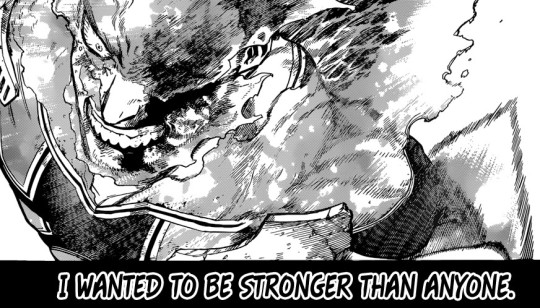
So how did I get to comparing the Egyptian sun god Ra to Endeavor? To sum it up, this is the fourth post in a set of analysis and meta about mythological influences in BNHA, so a lot of this builds on top of the info and connections I’ve made previously.
There are quite a few references and influences to Greek mythology in BNHA and personally I was very intrigued with the Hawks and Icarus parallels that kept popping up. In the myth of Icarus, the sun melts the wax off of Icarus’ artificial wings which causes him to fall and drown in the ocean. I saw Endeavor as one of Hawks’ metaphorical “suns”. While I sat on that, I began looking at Tokoyami, since he has a mentor-student relationship with Hawks, and found how he has Egyptian influences in his character design which I wrote about in a post here.
I began researching and reading through ancient Egyptian myths and information. One of the figures that caught my attention was the ancient Egyptian’s most important god: Ra, the sun god. (He is the falcon headed figure depicted below.) I quickly found some similarities between Ra and Endeavor.
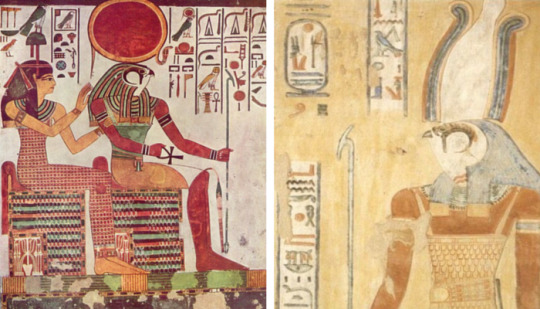
This image is from the expereince-ancient-egypt website.
Before I begin, I’d like to say I am very much aware that BNHA is a Japanese manga series and that the story is greatly influenced by Japanese culture and society. Unless there are very explicit examples (such as the case of Tokoyami) this post is not me saying that Horikoshi intentionally wrote certain characters and aspects inspired by Egyptian mythology. I just like like finding interesting similarities whether they were intentional or coincidental and writing about it.
That being stated, let’s begin.
Ra: The Egyptian God of the Sun
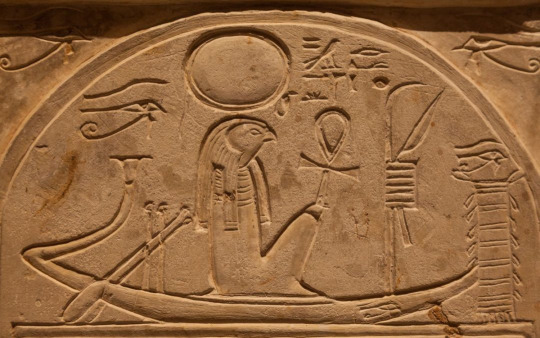
The original source of the image above is unknown.
So, who exactly is Ra?
Ra was the Ancient Egyptian sun god. The sun had a special place among the ancient Egyptians, they considered it the source of life. He was... the creator of the universe, one of the most famous deities...
Ancient Egyptians believed that Ra created himself, and his tears created humans. The setting of the sun means the beginning of the daily journey by Ra, in which he travels by his holy boat to the underworld every evening, to fight the forces of evil represented in a big snake called Apophis, and then returns to a brilliant triumph in the heights of the sky every morning on a new day. The ancient Egyptian saw this as a sign of human resurrection, and also evidence of Ra’s victory over the forces of chaos and evil (cleopatraegypttours).
Throughout all the websites I went through, Ra was very closely associated with the themes of the sun, life, the underworld, resurrection and victory over chaos and evil.
Let’s focus more on Ra’s journey through the underworld.
During his life he was required, as the incarnation and representative of the sun god, to maintain the cosmic and social order (ma’at) established by the god of creation. He had to repel the forces of chaos which constantly threatened the order of the world.
After his d/eath, the king united with the sun disk and his divine body merged with his creator. In his new role he continued to perform the task of subduing the powers of chaos. This active role of the king and sun god necessitated a detailed description of the d/amned, who represent the forces of evil.
Perhaps you may be starting to see the similarities and connections I began to form between Ra and Endeavor. If not, it’s okay. Sometimes II have to sit on a lot of the information I’m taking in before I see anything.
Endeavor’s Powers
Endeavor’s fire-based quirk is called “Hellflame.” The list of his named moves are: Flashfire Fist (Jet Burn, Hell Spider, Hell’s Curtain), Karmic Raze - Hellfire Storm, Raging Assault - Hell Minefield, Vanishing Fist, and Prominence Burn. As you can see, there’s a lot of mentions of the word: Hell.
While we can connect the “hell theme” back to Ra’s connections to the underworld, I would first like to point out what the Egyptian underworld was. We associate fire, suffering and other things with hell, however, this is a depiction that comes from the Abrahamic/Judeo-Christian religions.

The image above depicts a section of the Egyptian Book of the D/ead with Osiris on the left and the Weighting of the Heart taking place on the right.
There were many sources that described the extensive processes of the underworld and afterlife so I’m keeping it simple here. Anyways, the ancient Egyptians did not really have a concept of this sort of hell. Instead, after death, a part of the soul would travel through the underworld which was also known as Duat for judgement. They underwent a judgement process that had two parts and if they passed, they moved on to the Reed Fields which was Paradise. Those who failed simply ceased to be.
The “hell” that is probably being referred back to with Endeavor’s quirk and powers most likely was influenced with other cultures, again more specifically those with Abrahamic/Judeo-Christian religions. Despite this difference I do still think that there are other interesting similarities between Endeavor and Ra.
For example, I’ve already established in a previous post that I like to associate Endeavor to the sun. A lot of this post will rely heavily on what happened during the High End vs Endeavor fight. The move he is using above is called “Prominence Burn.” According to NASA:
a solar prominence (also known as a filament when viewed against the solar disk) is a large, bright feature extending outwards into the Sun’s hot outer atmosphere
This is the finishing move that helps Endeavor defeat the High End and this is very significant because it is the only move with a name that relates back to the sun.
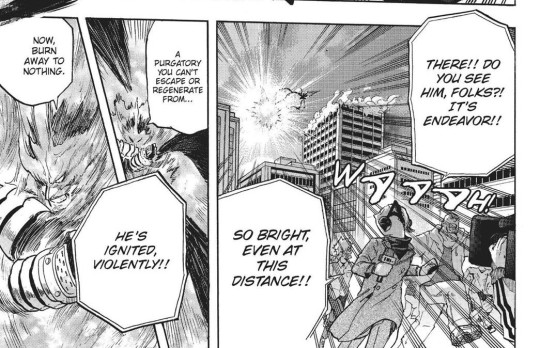
In Chapter 188 during the High End fight, Endeavor is even depicted as a fiery sphere of fire and light high up in the sky, very visually similar to the sun.
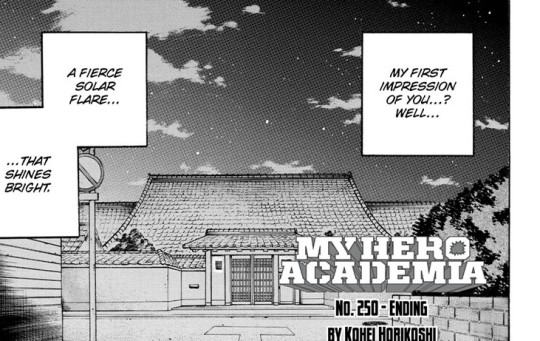
If you need more evidence for sun related themes surrounding Endeavor, Ending, the criminal who kidnaps Natsuo describes him as “A fierce solar flare that shines bright.”
One of Ra’s main duties is to keep order and defeat the “forces of chaos and evil.” Endeavor and the heroes in general sort of view themselves as this force of good and see the “villains” as enemies that have to be taken care of. I don’t agree with the ideas that “all heroes are good, and all villains are bad” and that is definitely not the message that Horikoshi is trying to send. It is because that sort of belief exists that hero society is flawed. Typically, when reading through mythology or religious texts, the themes of absolute good and absolute evil are common. Those are the contexts in which gods and other figures that exist. Humans are flawed and tend to stand somewhere in the in between.
That being stated, Ra and Endeavor are similar in their ties to the sun, underworld and sense of duty that they must defeat the “forces of chaos and evil” for the sake of everyone else.
High End vs Endeavor
Endeavor greatest ambition in life was to become the number one hero. He may act like a hero in the public’s eye but he does not have a “heroic nature” or “character.” He failed and broke his own family for the sake of his ambitions, and arguably, the Todoroki family came in to existence to serve a certain purpose. If he could not become the number one, then he’d make sure that someone with his blood and name would achieve that one day. However the unexpected happened. All Might had to retire and Endeavor was given the title as number one hero. He didn’t earn it. He was given it purely because he was the number two hero.
Let’s revisit the High End fight. This conflict happens shortly after the Hero Billboard Chart event. Japan is uneasy as their symbol of peace has retired and they do not know whether they can rely on the new number one hero. His family also is conflicted with his new position and how it was given to him. Throughout the fight we take a step in to Endeavor’s thoughts and inner monologue.
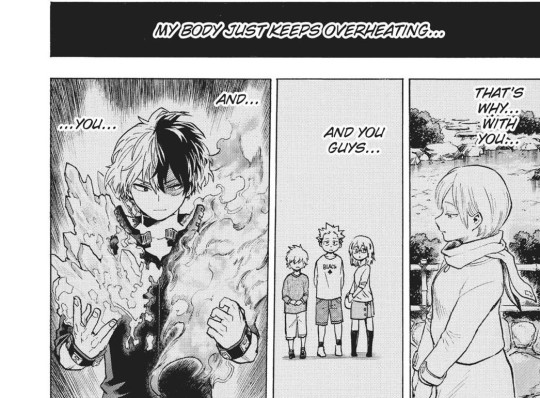
The manga panel above is from Chapter 188.
The High End is incredibly powerful and even with his powerful Hellflame quirk, Endeavor is having a hard time fighting against it. One of the weaknesses with having a fire related quirk is that it overheats his body so he’s had to rely on using his flames properly and cooling down afterwards. Because of this, he thinks about his family. The family that began because of this very weakness. His memory goes back to Rei when she is young, perhaps at the beginning of their arranged marriage or shortly before. Touya, Natsuo and Fuyumi are young as well. Standing far away and unhappy, maybe even nervous. And lastly, Shouto, the child he wanted to continue his legacy in, activating both his ice and hellflame quirks. He is the only one depicted in his actual current age.
On top of the very next page we get a scene with the High End Nomu speaking as seen below.
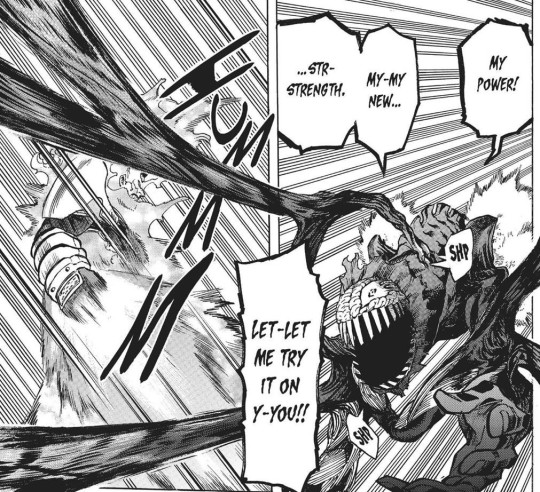
This Nomu came to fight and defeat whoever was the strongest. Despite it’s ability to speak, it is still mindless, declaring on and on about its power and strength. It does not care about who it is fighting and the destruction that is occuring along the way. The High End has multiple quirks that were chosen specifically to make it as powerful as it could be. Perhaps it was in this moment that something clicked in Endeavor’s mind.
Soon after, the High End strikes Endeavor multiple times, with one strike later leaving him with the scar that runs down the left side of his face. He falls to the ground and in to the rubble. Chapter 188 ends on this page with the manga panel seen below and everyone is left to wonder whether Endeavor is dead or alive.
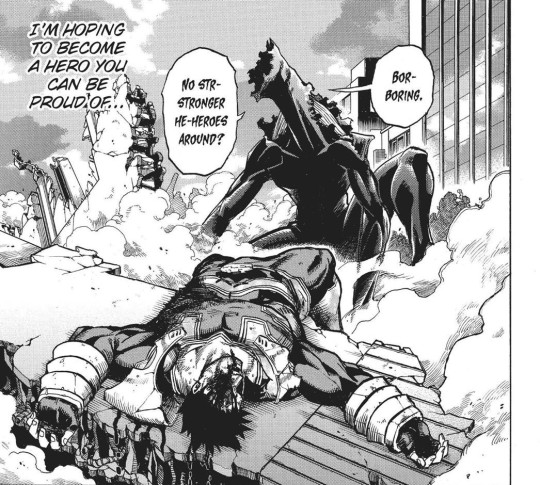
In Chapter 189 we see the effects of the void All Might left due to his retirement.
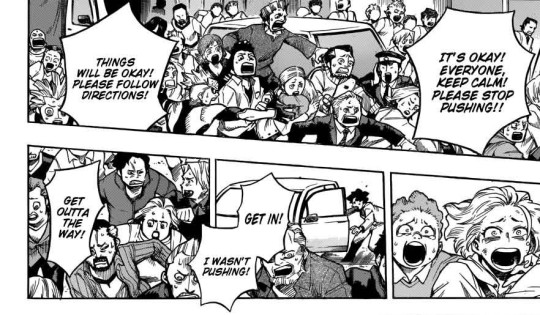
If the “villains” can’t be kept in check the public becomes chaotic with fear. A quiet night fell over Japan after All Might retired. People felt like the light was taken away. Then Endeavor gets up. With Hawks’ help he rises in to the air with wings on fire.
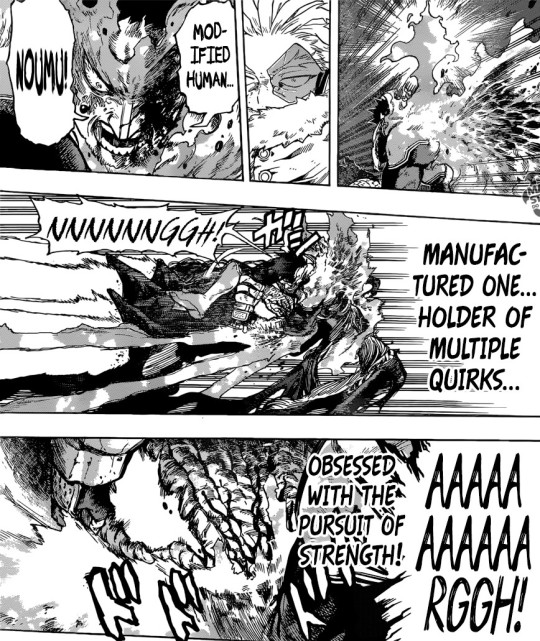
And in Chapter 190 he defeats the High End Nomu with Prominence Burn.

Endeavor and the Dawning Sun
There’s a lot of things going on here. Endeavor basically follows the journey Ra takes every single day to complete his duty. Similar to how Ra “dies” as he travels through the underworld, at one point we are led to believe that Endeavor has been killed by. As most of the battle took place up in the air, Endeavor physically falls when he “dies.” Leading up to the fall, he is thinking about his family and the past.
While Ra and Endeavor “resurrect” at different points in their journey, they both rise back again in order to fulfill their duty to bring back “order and balance.”
I’ve already written about the falcon/hawk headed Egyptian god Horus and Hawks, however I have yet to address the relationship between Ra and Horus. At some point, Ra was combined with Horus and became known as Ra-Horakhty which means “Ra, Horus of the Horizon.” Ra-Horakhty is most often thought of as the god of the rising sun. It is in this form that Ra rises in the sky to bring the dawn when he arises from the underworld.
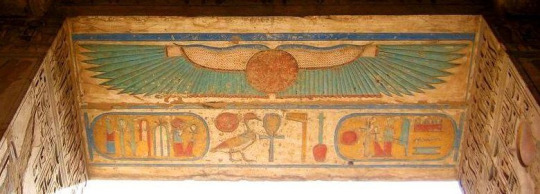
The original source of this image is unknown.
There is a deity (seen above) that appears a lot throughout architecture from ancient Egypt called “Horus-Behdity” who is depicted as a winged sun disc:
The winged sun disc is highly symbolic representing the Union of Horus the falcon God, and Ra the sun god, the union of the Two-Lands of Egypt, and becomes a symbol of rebirth for the kings (British Museum).

Although it is Endeavor who ultimately defeats the High End, it is with the aid of Hawks’ quirk that he is able to land the finishing blow. He rises in to the sky like the winged sun disc: Endeavor as the sun, and Hawks as the wings. I think the depiction of Hawks with his back towards he audience and Endeavor burning them with his flames on the cover of Volume 21 says a lot of things (including the Icarus parallels!).
Taking a couple steps back, the wording on the pages where Endeavor addresses the nomu and then before uses the finishing move Prominence Burn on the High End is important.
“Modified human... Noumu! Manufactured one. . . Holder of multiple quirks. . . Obesessed with the pursuit of strength!” (Chapter 190)
“You are... Just like me! From the past, or perhaps from an alternate future. Now burn, and rest for all eternity!” (Chapter 190)
Endeavor is a controversial character that because of his past and the horrible things he did to his family. However, we can not ignore what has been written in the manga. I’m not going to argue or talk too much about my own thoughts and opinions here, but I think it is important to address what happened during this High End fight.
He identifies himself with the Nomu: the power hungry and mindless creature. It’s interesting that he uses the phrases of “manufactured” and “holder of multiple quirks,” and “pursuit of strength” which are words that are heavy with meaning to him: the arranged marriage he purchased, the children he neglected and the “perfect” child he sought after for the sake of strength.
The train of thoughts that had begun in his mind is expressed outwards. He shouts them out in to the sky. He acknowledges the past (however to what extent is debatable), and even addresses the future. I’m not sure if he’s acknowledging that he may fail to change or that he hopes that he can change what he can.
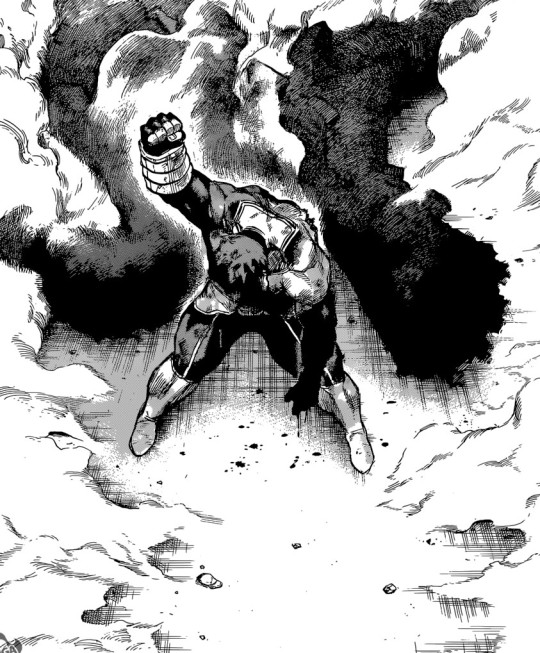
He then defeats the High End. Endeavor had been given the number on hero position but this victory is what “establishes” him with the title in the eyes of the public. With the bright light of All Might gone, the public is inspired by a new light, the sun that Endeavor represents bringing a dawn to the night. His victory pose is reminiscent of All Might’s however it is with his other arm that is in the air, he’s slumped over and his legs are barely keeping him up. The flames that usually cover his face and body are gone as well. This is the victory of Endeavor the hero but it could also be Todoroki Enji as a father making a statement.
I’m not sure if this is him symbolically k/illing the monster he was, or if this is symbolic as to where Endeavor’s journey will ultimately head towards, or if its a representation of hopes that never come true later on. I’m not trying to paint this piece from a pro-Endeavor stance or an anti-Endeavor stance but merely trying to explain how I interpreted the events of the High End fight and the thematic meanings it had as it unfolded. At the end of the day, we all have different opinions and interpretations and you have all the right to disagree with everything I’m writing in this post.
(The case with Endeavor is very complicated and I don’t want to get to deep in to it here however) We definitely should not forget what Endeavor did in the past but at the same time we should not ignore the efforts and progress he has tried to make. While we must hold people accountable for their actions, it is not wrong for someone to want to change or become better. Endeavor may “fail” or he may be able to “succeed,” whatever either entails or looks like. However even though we do get the depiction of a rising sun, you have to remember that the sun also sets.
Anyways, what has been established was that this fight is where Endeavor explicitly expressed his acknowledgement of the past (maybe not in its entirety but it is a big first step). And it is directly after this step that we take a deep dive in to what facing the past will look like for Endeavor.

#endeavor#todoroki enji#hawks#takami keigo#bnha analysis#mha analysis#mythological influences#bnha meta#mha meta#dabi#todoroki touya#todoroki family#todoroki shouto#luna writes#my post
59 notes
·
View notes
Note
Hope the 10 € help- my name is Marie-Christine. I don't really have a specific question- I am just curious what you might find and what advice or guidance you might give. All the best

Hello Marie and thank you for your help.
We start with a quote: happiness is a divine gift Aristotle.
With the oracles of the angels: your sentences are:
- We leave you a white feather so you know we are near you
- problems are often a disguised opportunity
- you already have everything you need to succeed
With the Akashic tarot: we start with the king of the forces, it is your energy currently or where you are going to go. The sky is black and yet a purple light emerges, a new force arrives, a new stage of life enriching in all areas, you are close to this stream and the animals are near you, they do not feel any threat, they are there to guide you in this forest because they know it well.
We move forward with a new chapter, a new lesson in life with the Akashic fields, crystal clear communication with your guides with new vitality, a new approach to communication and new creativity with this green, blue and orange night.
We run on a very calm one, we let ourselves be guided by the light of the moon, we know our way and our place of arrival, no threat on the horizon, the archance Uriel is there to guide you in this stage of life, with a lot of strength and sign (observe the ground and the sky birds and feathers)
We continue with the oracles of Greek mythology:
We take care of ourselves like Artemis, we know our goals, we know how life can challenge us but yet, we move forward, we do not let ourselves be guided by fear, the universe is hiding something from you because we have the horai guardian of the divine time, daughters of Zeus, they know things thanks to their mother themis, an abundance will come a good time for you, the secret card does not scare me because it is accompanied by apollo yet a son of Zeus. He is the guardian of light, he triumphs over darkness, he imposes himself in the sky, he is a luminous being.
With the tarots we feel blessed by the gods, you accept all the abundances in any form but there is something that slows down that stagnates we are working on it, on an aspect of life, it is not yet demonstrate but I am told it is a matter of time because we end with the 6 sticks = victory then the last 9 a last effort before a reward then we end with strength, we win.
8 notes
·
View notes
Text
Fall Reading List
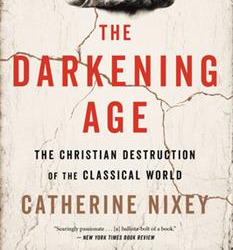
The Darkening Age : The Christian Destruction of the Classical World by Catherine Nixey
A New York Times Notable Book - A New York Times Book Review Editors' Choice Named a Book of the Year by the Telegraph, the Spectator, the Observer, and BBC History Magazine.
In Harran, the locals refused to convert. They were dismembered, their limbs hung along the town's main street. In Alexandria, zealots pulled the elderly philosopher-mathematician Hypatia from her chariot and flayed her to death with shards of broken pottery. Not long before, their fellow Christians had invaded the city's greatest temple, smashing its world-famous statues and destroying all that was left of Alexandria's Great Library. Today we refer to Christianity's conquest of the West as a "triumph." But this victory entailed an orgy of destruction in which Jesus's followers attacked and suppressed classical culture, helping to pitch Western civilization into a thousand-year-long decline. In The Darkening Age, Catherine Nixey brilliantly resurrects this lost history, offering a wrenching account of the rise of Christianity and its terrible cost. "A feast of tales of murder, vandalism and] willful destruction . . . Nixey has a great story to tell, and she tells it exceptionally well." -- Guardian " A] bold, dazzling and provocative book." -- Peter Frankopan, best-selling author of The Silk Roads.
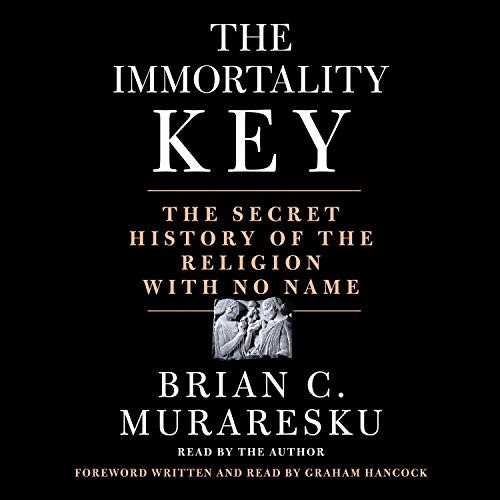
The Immortality Key : The Secret History of the Religion with No Name by Brian C. Muraresku
A groundbreaking, controversial dive into the role psychedelics have played in the human experience of the Divine and the development of religion throughout Western history. The Immortality Key connects the lost, psychedelic sacrament of Greek religion to early Christianity--exposing the true origins of Western Civilization. In the tradition of unsolved historical mysteries like David Grann's Killers of the Flower Moon and Douglas Preston's The Lost City of the Monkey God, Brian Muraresku's 10-year investigation takes the reader through Greece, Germany, Spain, France and Italy, offering unprecedented access to the hidden archives of the Louvre and the Vatican along the way. In The Immortality Key, Muraresku explores a little-known connection between the best-kept secret in Ancient Greece and Christianity. A secret with the capacity to revolutionize our understanding of the past and chart a bold, new course for the future. Before Jerusalem, before Rome, before Mecca--there was Eleusis: the spiritual capital of the ancient world. It promised immortality to Plato and the rest of Athens' greatest minds with a very simple formula: drink this potion, see God. Shrouded in secrecy for millennia, the Ancient Greek sacrament was buried when the newly Christianized Roman Empire obliterated Eleusis in the fourth century AD. Renegade scholars in the 1970s claimed the Greek potion was psychedelic, just like the original Christian Eucharist that replaced it. In recent years, vindication for the disgraced theory has been quietly mounting in the laboratory. The rapidly growing field of archaeological chemistry has proven the ancient use of visionary drugs. And with a single dose of psilocybin, the psycho-pharmacologists at Johns Hopkins and NYU are now turning self-proclaimed atheists into instant believers. With convincing analysis and a captivating spirit of quest, Muraresku mines science, classical literature, biblical scholarship and art to deliver the hidden key to eternal life, bringing us to what clinical psychologist William Richards calls "the edge of an awesomely vast frontier." Featuring a Foreword by Graham Hancock, the New York Times bestselling author of America Before: The Key to Earth's Lost Civilization.
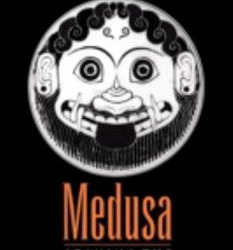
Medusa : Solving the Mystery of the Gorgon by Stephen R. Wilk
Medusa, the Gorgon, who turns those who gaze upon her to stone, is one of the most popular and enduring figures of Greek mythology. Long after many other figures from Greek myth have been forgotten, she continues to live in popular culture. In this fascinating study of the legend of Medusa, Stephen R. Wilk begins by refamiliarizing readers with the story through ancient authors and classical artwork, then looks at the interpretations that have been given of the meaning of the myth through the years. A new and original interpretation of the myth is offered, based upon astronomical phenomena. The use of the gorgoneion, the Face of the Gorgon, on shields and on roofing tiles is examined in light of parallels from around the world, and a unique interpretation of the reality behind the gorgoneion is suggested. Finally, the history of the Gorgon since classical times is explored, culminating in the modern use of Medusa as a symbol of Female Rage and Female Creativity.
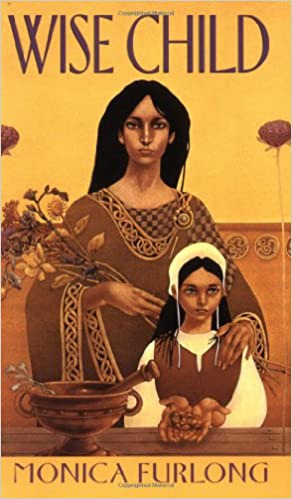
Wise Child by Monica Furlong
Children’s fiction. In a remote Scottish village, nine-year-old Wise Child is taken in by Juniper, a healer and sorceress. Then Wise Child’s mother, Maeve, a black witch, reappears. In choosing between Maeve and Juniper, Wise Child discovers the extent of her supernatural powers—and her true loyalties.
#immortality key#monica furlong#wise child#medusa#stephen r wilk#brian c muraresku#catherine nixey#classics#christian history#pagan history#kykeon#hellenic polytheism#reading list#hellenismos#ancient greece
44 notes
·
View notes